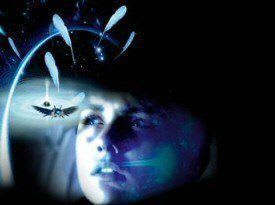As part of its See Further: the Festival of Science + Arts programme to celebrate the 350th anniversary of the Royal Society, the Royal Festival Hall staged the European premiere of an exciting multimedia offering for all ages by Philip Glass et al.
On its opening night, this was accompanied by the symphonic version of John Adams' opera Doctor Atomic.
This meant that a historic institution was celebrated by the two greatest living exponents of that very modern phenomenon, minimalist music, which, in view of the Royal Society's adventurous ethos, might seem wholly appropriate.
This proved to be a fascinating evening, as arts and sciences fused for a couple of pleasurable hours that should have enthused youngsters in a variety of ways, particularly after the interval.
Doctor Atomic Symphony
The curtain raiser was opened by a recitation of John Donne's Batter My Heart, a short poem that Adams used to illuminate the experiences of J Robert Oppenheimer, the man who "invented" the atomic bomb.
For anybody who believes that classical music is boring, this should prove the ultimate antidote. This symphony starts off like a runaway train. In keeping with this, conductor Marin Allsop immediately brought to mind Gerard Hoffnung's skits on her profession, such was her remarkable physicality. Indeed, had a recent England goalkeeper been as agile, the country's favourite anti-heroes might still be contesting the World Cup.
The sweeping music tells its own tale, and is at times explosive, thanks to the wonderful efforts of the London Philharmonic Orchestra and more particularly its talented percussionists and principal trumpeter, Paul Beniston.
Icarus at the Edge of Time
In recreating the myth of the boy who flew too close to the sun for the space age, Icarus at the Edge of Time utilises three very diverse artistic media. Pleasingly, each of the elements is strong enough to survive on its own merits, making the combination something really special.
Somewhat unexpectedly, Brian Greene, who wrote the children's story on which the piece is based, turns out to be what might sound to some like an oxymoron, a witty physicist without any great degree of eccentricity.
Forget about mad professor types, this particular genius is a man of the people who promises to explain the theory of relativity and black holes in four minutes, as a prologue to the more serious business. Give or take a minute, he then delivers.
His lines, adapted with the assistance of M Butterfly writer David Henry Hwang, are read by British actor David Morrissey, showing great fluency and a suitably dramatic delivery.
The tale that he narrates is of a futuristic Icarus, who is born on a spaceship that is heading for distant galaxies in the hope of discovering an extra terrestrial life form.
The 14-year-old is clearly something of a scientific prodigy and creates his own winged spaceship to explore the environs of a black hole. From there, the story is not too different from that of his classical predecessor, although this youngster does generate a rather happier twist in the tale.
The music is pure Philip Glass and rumbles along at a good lick, ensuring that the attention is held and the action complemented.
The third leg of the production is created by computer-video experts Al and Al. They ferry us into outer space and, as the music pounds along and Morrissey keep space, they create dazzling effects to illuminate the music and writing.
The whole is worth far more than the sum of its parts and anybody who gets the opportunity to witness this visual/musical extravaganza as it tours the world is strongly urged to do so.
